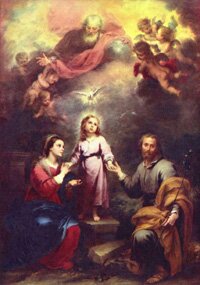
Melchizedek (Hebrew:
מלכי–צדק Malkiy-Tsedeq, sometimes written Malchizedek, Melchisedec, Melchisedech, Melchisedek or Melkisedek), is a figure mentioned by the Hebrew Bible, in the Book of Genesis, where he interacts with Abraham:
18 And Melchizedek king of Salem brought out bread and wine. (He was priest of God Most High.) 19 And he blessed him and said,
"Blessed be Abram by God Most High, Possessor of heaven and earth; 20 and blessed be God Most High, who has delivered your enemies into your hand!" (Gen. 14:18-20 ESV)
and in a Psalm, of David.
Exalted things are spoken of Christ in Psalm 110. He should not only be the unrivalled King above all the kings of the earth, but He has simultaneously always existed, in glory, as the eternal Son of God. He will rest, while sitting at God's right hand, after completing His work and suffering; He will dispense law, and judgment upon the enemies of the Most High God. Yet, He remains seated as the eternal King. All his enemies are known and collected, but the time has not yet arrived that they should be his footstool. His kingdom, being established, will be impregnable in the world, despite all its powers of darkness.
The Body of Christ are an intended, intentional and willing people. The active Spirit of Christ, bringing to attention the dark powers of this world, to Christ's believers, is the driving force for their willingness to be His Kingdom. They will be in His service in the radiant accouterments of Holiness; this is attractive and acceptable to His people, forevermore. Many will be steadfast and faithful to Him. The morning dew of our springtime, even when we are but children, should be a hallowed time, a time dedicated to our Lord and King, Jesus. But He will not only be our King, but also our Priest. He is God's missionary to us and for us, and He is our defender with the Father. He is the conciliator between God and man. He is "a Priest of the order of Melchizedek," before the time of Aaron and the Levites, and in many regards, even greater than this order. As Christ sits at the right hand of God, His enemies should tremble, yet His people should be joyful. His victory over the powers of darkness and death will be the utter destruction of His enemies. Christ has paid our debt, He has reinstated us to the position held by man before the fall of man. He saves his friends, and He comforts them. He will be humbled; he will drink of the brook as He completes His mission. It is the wrath of God, working within the deadly poison of the law, that we can understand as, "He will drink from the brook by the way." He did drink of the waters of anguish, pain and sorrow along the way to His eternal thrown. But He will be elevated above all. He has won, and He has shared the full bounty of His victory with those who love Him!
More...
 The Anointed One refers to The Messiah, Christ the Lord, The Chosen One of God.
The Anointed One refers to The Messiah, Christ the Lord, The Chosen One of God. Hillsong United Nothing But The Blood
Hillsong United Nothing But The Blood











